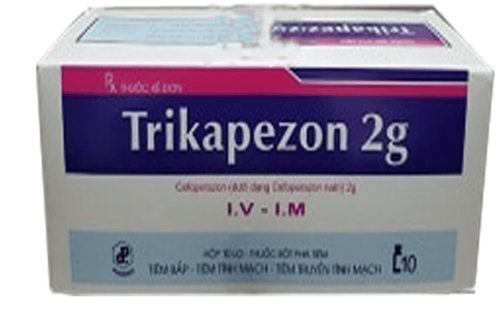This is an automatically translated article.
Cefradine is an antibiotic belonging to the cephalosporin group. The drug is available in oral dosage forms (250mg, 500mg capsules) and injection form. The effect of Cefradin 500mg is to treat bacterial infections.1. Effects of Cefradine
Cefradin is used to treat bacterial infections including: pharyngitis, sinusitis, tonsillitis, laryngitis - tracheobronchitis - bronchiolitis, chest infections (pneumonia or bronchitis), ear infections (otitis media), skin infections bladder, urethral and kidney infections, bone infections, sepsis, etc. In addition, Cefradin is also used to prevent high-risk infections after surgery.2. How to take and dose of Cefradin
Dosage of Cefradin depends on oral or parenteral route, for adults or children. Specifically:
2.1 Usage and dosage for adults Oral: Oral: 100-200mg/day, divided into 2-4 doses/day. The maximum dose is 400mg/day; Parenteral route: Severe infections: 200-400mg/day, divided into 4 doses by deep intramuscular injection or slow intravenous injection over 3-5 minutes or intravenous infusion. The maximum dosage is 800g/day; Prevention of infection after surgery: Intravenous or intramuscular injection of 100-200mg before surgery. The infusion can be repeated at appropriate intervals (if necessary). 2.2 Administration and dosage for children Oral: Used for susceptible infections. Dosage is 25-50mg/kg/day, divided into 2-4 doses/day. For the treatment of otitis media in children, a dose of 75-100mg/kg/day can be used; Parenteral route: Used for severe infections. Dosage is 50-100mg/kg/day, divided into 4 doses/day. The dose can be increased to 300mg/kg/day.

Thuốc Cefradine cần được sử dụng đúng liều lượng
3. Precautions when using Cefradine
Follow the doctor's instructions on when and how to take the medicine; Dosage is indicated based on the patient's medical condition and response to treatment; Do not arbitrarily stop taking the drug, use it more often or more often than prescribed by the doctor; If the drug overdose, the patient should call an ambulance or go to the nearest medical facility for assistance in handling; If you forget to take a dose of Cefradine, you should take it as soon as possible. If it is almost time for your next dose, you can skip the missed dose and take your next dose at the prescribed time; Tell your doctor if your condition does not improve or gets worse.
4. Side effects when using Cefradin
Patients should stop taking Cefradine and tell their doctor immediately if they experience any serious side effects such as: severe bloody diarrhea, severe blistering, swelling of the face, lips, tongue, difficulty breathing, angina , itchy skin , ... This could be a manifestation of an allergic reaction . This side effect is rare but very serious and requires immediate medical attention.
In addition, patients using Cefradin may also experience some other side effects such as: stomach pain, nausea, vomiting, headache, confusion, skin rash, dizziness, trouble sleeping, too hyperactivity, anxiety, thrush, angina, heartburn, vaginal infections, stiffness and pain in joints, fever, sore tongue or mouth, kidney inflammation (may decrease urine output, bloody urine or cloudy), liver problems (dark urine, pale stools, yellow eyes, jaundice), blood disorders (causing more infections, weakness, pale skin, fatigue, gasp,...).

Thuốc Cefradine có thể khiến người bệnh cảm thấy đau tức ngực
5. Precautions while using Cefradin
If you have the following conditions, you should not use Cefradine:
You are allergic to cefradine or any of the ingredients in this medicine; Allergy to antibiotics in the penicillin group; Hypersensitivity to food or chemicals; Patients with liver failure, kidney failure; People who are having or are about to have surgery. You should tell your doctor if you experience any of the following:
Kidney problems: A lower dose of Cefradin may be required; Diabetes : If chemical tests are used to check for sugar in the urine, Cefradin can cause erroneous results. This condition does not occur if testing with a test strip or a blood glucose test; Have an intolerance to certain sugars (because Cefradin contains lactose); Pregnancy and breast-feeding: There are not enough studies to determine the risks of using this drug during pregnancy and breast-feeding. Therefore, before taking Cefradin, patients should consult their doctor. Cefradine may interact with a number of other medications. Therefore, before using this drug, the patient needs to list the drugs he is taking and notify the doctor immediately. At the same time, patients should consult their doctor about the use of alcohol, beer, foods, ... during the use of Cefradin.
Cefradin is an antibiotic, indicated for the treatment of upper and lower respiratory tract infections, urinary tract infections or some other chronic diseases. When taking the drug, the patient should absolutely follow all the instructions of the doctor about the dose, the time of use, ... to ensure effective treatment, reduce the risk of complications.
Please dial HOTLINE for more information or register for an appointment HERE. Download MyVinmec app to make appointments faster and to manage your bookings easily.













